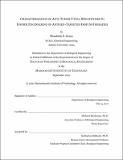Characterization of anti-tumor T cell specificities to inform engineering of antigen-targeted immunotherapies
Author(s)
Grace, Elizabeth E.
DownloadThesis PDF (15.55Mb)
Advisor
Birnbaum, Michael
Terms of use
Metadata
Show full item recordAbstract
Over the past several decades, advances in immunotherapy have revolutionized cancer treatment. Immune checkpoint blockade has resulted in durable responses for some patients, but others have not seen the same benefits. T cells are essential to the success of many immunotherapies, as their receptors can recognize peptide antigens presented by major histocompatibility complexes (MHCs); productive recognition of antigens displayed by tumors results in T cell-mediated killing of the tumor cells. However, it is not always known what antigens are being recognized by cytotoxic T cells. Thus, there are many avenues of research being pursued to broaden and improve responses to cancer therapy, including T cell antigen identification and the development of combination immunotherapies.
In this thesis, we characterized the CD8+ T cell response to murine melanoma following combination immunotherapy. Sequencing of tumor-infiltrating T cells revealed a set of clones with strikingly similar T cell receptors (TCRs) that were particularly expanded in treated mice and likely recognized a shared antigen. We identified the antigen recognized by these clones as the p15E peptide from the envelope protein of murine leukemia virus, an endogenous retrovirus. When vaccination against this peptide failed to raise a protective T cell response in vivo, we utilized yeast displayed peptide-MHC libraries to identify mimotopes (peptide mimics) of the p15E antigen. Several mimotopes were found to exhibit increased affinity or activity for the T cell clones. Vaccination of mice with mimotope peptides induced a significant expansion of CD8+ T cells cross-reactive to the p15E antigen and resulted in delayed tumor growth. Together, this work demonstrates the identification of a dominant tumor-associated antigen and the targeting of mimotopes of this antigen in a prophylactic vaccine setting to improve the anti-tumor immune response.
Date issued
2021-09Department
Massachusetts Institute of Technology. Department of Biological EngineeringPublisher
Massachusetts Institute of Technology